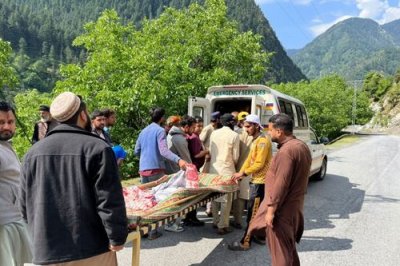
Kashmiris injured in cross-border fights between India and Pakistan are evacuated from Neelum valley in Pakistani-administered Kashmir on Saturday. Photo by EPA-EFA
May 10 (UPI) — India and Pakistan on Saturday agreed to an “immediate cease-fire,” the neighboring Asian nations and U.S. President Donald Trump announced.
The Asian nations, both of which are nuclear powers, paused fighting at 5:00 p.m. local time after weeks of increasing skirmishes that have included airstrikes from both sides, including early on Saturday.
Once fighting stopped, Pakistan fully reopened its airspace for all flights across the country after being closed for several hours, CNN reported.
“After a long night of talks mediated by the United States, I am pleased to announce that India and Pakistan have agreed to a FULL AND IMMEDIATE CEASEFIRE,” Trump posted on Truth Social before 8:00 a.m. EST. “Congratulations to both Countries on using Common Sense and Great Intelligence. Thank you for your attention to this matter!”
The nations’ leaders also confirmed the cease-fire.
“Pakistan has always strived for peace and security in the region, without compromising on its sovereignty and territorial integrity!” Pakistan’s Foreign Minister Ishaq Dar wrote on X.
Indian Foreign Minister S. Jaishankar, also posted on X, saying that “India and Pakistan have today worked out an understanding on stoppage of firing and military action. India has consistently maintained a firm and uncompromising stance against terrorism in all its forms and manifestations. It will continue to do so.”
Both sides agreed to talk again Monday.
Britain also played a key role in the talks, the BBC reported. Also involved were Saudi Arabia and Turkey, CNN reported.
“I urge both parties to sustain this. De-escalation is in everybody’s interest,” British Foreign Secretary David Lammy in a post on X.
A Pakistani government source told CNN that the United States played a crucial role in the talks, which occurred during the last 48 hours and included U.S. Secretary of State Marco Rubio and Vice President JD Vance.
In a statement, Rubio said the nations have agreed “to start talks on a broad set of issues at a neutral site.”
“We commend Prime Ministers Modi and Sharif on their wisdom, prudence and statesmanship in choosing the path of peace,” Rubio added.
On April 22, tourists were massacred in Indian-controlled Kashmir. At least 25 Indian citizens and one Nepali national died in an area only accessible by foot or on horseback
India blamed Pakistan, launched “Operation Sindoor” and targeting nine locations within Pakistan and Pakistan-administered Kashmir. Islamabad has denied involvement in the massacre.
Pakistan’s Prime Minister Shehbaz Sharif said that retaliatory strikes Saturday against India specifically targeted military infrastructure in New Delhi that he said was used to launch earlier attacks in “a powerful and well-coordinated response,” according to CNN.
Eleven people were killed, including a child, and 56 others injured by India along the Line of Control, Pakistan said.
“Last night, intense shelling from the Indian side took place at more than five different locations along the Line of Control,” Pir Mazhar Saeed Shah said.
Hindu-majority India and Muslim-majority Pakistan each control parts of Kashmir, fighting wars over the territory in 1965, 1971 and 1999.
In Pakistan-administered Kashmir, Indian shelling has damaged 235 homes, including 29 completely destroyed, Pakistan’s Shah said.
A shopkeeper in Pakistan’s capital, Islamabad, earlier told a BBC reporter that they are “not really worried about my safety, but I don’t know how this can end. War is bad for people in both countries, no matter their religion.”
China, which borders the two nations, also weighed in on the fighting.
“China is closely following the current situation between India and Pakistan and is deeply concerned about the escalation,” a spokesperson for China’s Foreign Ministry said in a statement on Saturday.
“We strongly urge both sides to prioritize the broader interest of peace and stability, remain calm and restrained, and return to the path of political resolution through peaceful means,” the statement said
The International Monetary Fund announced that it will give an approximately $1 billion loan to Pakistan for relief, which is part of a $7 billion bailout Pakistan secured from the IMF in September 2024.